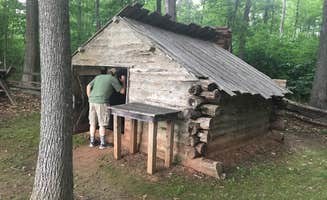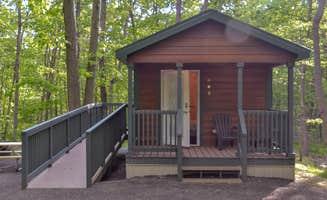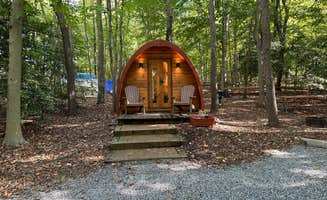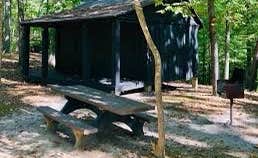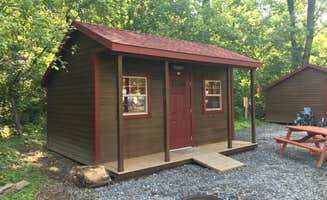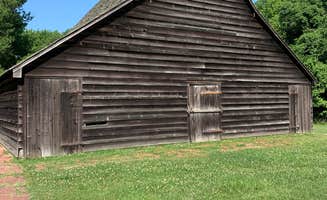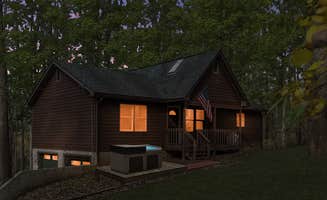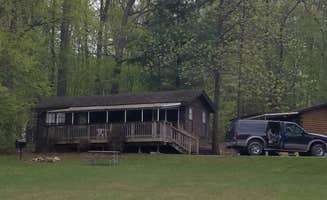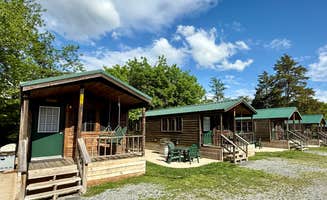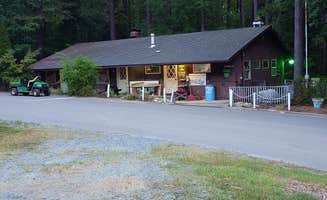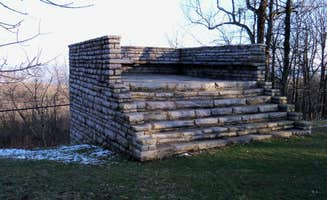Cabin accommodations near Reston, Virginia offer camping options within 20-45 minutes of the DC metro area. The region features forested terrain with elevations ranging from 200-600 feet above sea level and moderate humidity throughout summer. Most cabin rentals operate seasonally, with limited options available during winter months when temperatures can drop below freezing.
What to do
Historical exploration: 6 miles away. Harpers Ferry Campground provides direct access to historical sites. One reviewer notes: "You can walk the trail right next to the campground into the historical town of Harper's Ferry. The trail is about 1.5 miles one way." For history enthusiasts, this location combines outdoor recreation with educational opportunities.
Fishing: Multiple access points. Pohick Bay Campground offers fishing access along Mattawoman Creek. "Eagles everywhere!" writes one camper. The fishing spots are accessible without extensive hiking, making them suitable for casual anglers or families. The area is known for bass, catfish, and perch.
Water activities: Seasonal options. Multiple cabin locations offer water recreation from May through September. At Brunswick Family Campground, visitors appreciate the river access: "The Shenandoah is just as beautiful. The little store has just the necessities and there is an amazing playground for the kids." Water temperatures average 75-80°F during summer months.
What campers like
Private wooded sites: At Little Bennett Campground, cabin sites include natural screening. "The sites are quiet, very spacious, level, and heavily wooded with 50A service," reports one visitor. This setup provides a balance between amenities and natural setting that many campers prefer.
Cabin comfort levels: Most cabins include basic furnishings but vary in amenities. "We stayed in a cabin for 2 nights and had a great time," writes a Bull Run Regional Park visitor. "There are miles of trails and my gkids enjoyed the nature scavenger hunt. You even get a prize when you finish." Trails are well-marked with maps available at registration.
Shower facilities: Bathroom cleanliness varies between locations. "I'll go again just for the showers," notes one Bull Run camper. "They're with staying again alone. Locking doors, individual stalls. Best camping showers I've ever had." Other campers mention that bathroom facilities at some locations are cleaned daily but may be limited during peak usage times.
What you should know
Train noise considerations: Several cabin locations have nearby railroad tracks. At Harpers Ferry Campground, one visitor explains: "The only downside is you are directly next to train tracks but being from the city, this noise doesn't bother my husband or me." Trains typically run throughout day and night at varying frequencies.
Seasonal operation limitations: Not all cabin facilities remain open year-round. Little Bennett Campground operates from "April 1 to October 30," while Harpers Ferry Campground runs from "April 1 to October 31." Winter cabin options are more limited but include Cherry Hill Park, which remains open throughout the year.
Reservation requirements: Most cabins require advance booking, especially during summer and holiday weekends. Reservation windows typically open 6-12 months in advance. "We reserved 137 days prior to arriving," notes one Little Bennett visitor, highlighting the importance of planning ahead for preferred dates.
Tips for camping with families
Activity planning: Schedule structured time. Family-oriented parks offer organized activities. "The campground had a climbing wall on one afternoon... They had a campfire complete with s'mores followed by hayrides," writes a Bull Run visitor. Most activities run from late morning through early evening with schedules posted at registration.
Playground access: Check proximity. When reserving cabins with children, check playground distances. One camper at Bull Run notes: "Only draw back is that there's only one playground that's awkwardly located." Some families bring portable games as alternatives for evening entertainment.
Space considerations: Request end sites. For families needing more room, end-of-loop sites typically offer additional space. At Cherry Hill Park, a visitor recommends: "Look at the park map and try to get a site at the end of a row. The sites are pretty close together but on the ends at least you only have a neighbor on one side."
Tips from RVers
Site leveling challenges: Campers with larger RVs should inquire about specific site grades. One Little Bennett visitor notes: "Site #D69 level side-to-side but we were forced to greatly elevate front of trailer to level front-to-back." Most parks can provide information about which cabin sites accommodate larger vehicles more easily.
Seasonal amenity availability: RV facilities often change seasonally. "We stayed at Bull Run Regional Campground on our visit to Washington DC. It was fall and the colors were gorgeous," writes one camper. "Bath houses are clean and well maintained. Our site was very level, but I could see that some others were not so much, so you might want to ask about that."
Proximity to urban attractions: Cabin locations offer varying access to DC attractions. One Cherry Hill visitor explains: "Proximity to DC and surrounding areas can't be beat. Uber, Lyft, bus, shuttle. It takes about a half hour to get downtown to the monuments." Transportation costs typically range from $20-45 per ride depending on distance and time of day.


